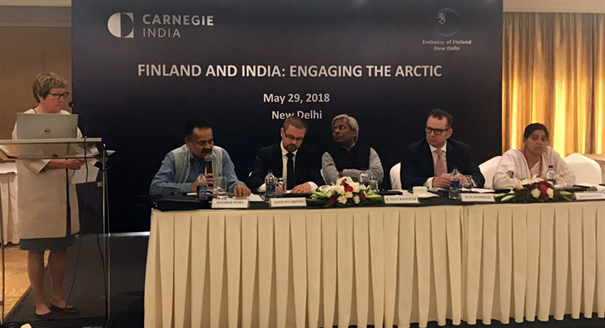{
"authors": [
"M. Rajeevan",
"K. Vijay Raghavan",
"René Söderman",
"Antti Hyvärinen",
"Shekhar Sinha",
"Stuti Banerjee",
"Nina Vaskunlahti"
],
"type": "event",
"centerAffiliationAll": "",
"centers": [
"Carnegie Endowment for International Peace",
"Carnegie India"
],
"collections": [],
"englishNewsletterAll": "",
"nonEnglishNewsletterAll": "",
"primaryCenter": "Carnegie India",
"programAffiliation": "",
"programs": [],
"projects": [],
"regions": [
"India",
"Europe"
],
"topics": [
"Foreign Policy"
]
}
Finland and India: Engaging the Arctic
Tue, May 29th, 2018
New Delhi
The Arctic is an environmentally sensitive region, which is experiencing dramatic melting of its ice sheets. International cooperation must be the basis to mitigate the effects of climate change and ensure sustainable development in the Arctic.
Carnegie India, in partnership with the Embassy of Finland in India and the Office of the Principal Scientific Advisor to the Government of India, hosted a seminar to discuss Finland and India’s engagement in the Arctic.
DISCUSSION HIGHLIGHTS
- Climate Change in the Arctic: Participants noted that the region is considered to be a global barometer of climate change. Pointing out that the Arctic will be ice-free by 2060 and free of summer sea ice in the 2030s, they noted that this will change the flora and fauna of the region and lead to rising sea levels. Participants also noted that the thawing of the permafrost in the Arctic could release trapped methane, a greenhouse gas, and further accelerate global warming. Speakers highlighted the urgent need for reducing black carbon emissions to slow Arctic warming.
- Arctic Cooperation: Participants traced the origin of international cooperation in the Arctic to negotiations aimed at developing an Arctic environmental protection strategy, in light of pollution and radioactive contamination in the region, during the Cold War. These agreements, signed in 1991, were a first step toward the establishment of the Arctic Council in 1996. Participants discussed that the region is poised to emerge as an important hub of the 21st century as the melting of sea ice opens new shipping routes, makes the region’s natural resources accessible, and could lead to increased migration and geopolitical shifts. They emphasised the need for deeper and more inclusive cooperation among members and observers of the Arctic Council. They noted that this will help mitigate the impact of climate change in the region, prevent environmental accidents, protect the marine environment, and develop the region’s resources and infrastructure sustainably. It was also noted that achieving deeper collaboration requires involving indigenous peoples in the Arctic, who are a valuable asset for understanding the region’s environment. Discussants commended the Arctic Council as a forum where cooperation between countries has been effective despite international tensions.
- Finland’s Chairmanship of the Arctic Council: Participants emphasised that climate change and sustainable development were the two pillars of Finland’s chairmanship. They discussed the need to fully implement the Paris Climate Accord and work toward the goals of the United Nations 2030 Agenda for Sustainable Development to mitigate climate change and strengthen resilience in the Arctic. They noted that Finland intends to explore solutions to common problems in the Arctic, focusing on environmental protection, connectivity, education, and meteorological cooperation. Focusing on the latter, participants discussed that as human activities in the Arctic increase, developing meteorological cooperation will improve forecasting and navigation services to ensure the safety of Arctic communities, businesses, and authorities.
- India as an Observer State: Participants discussed that melting sea ice and ice sheets in the Arctic will lead to a rise in sea levels and change in weather patterns which, in turn, will displace people from coastal regions around the world and disrupt their livelihoods. Discussants noted multiple challenges for India, including the displacement of the 171 million people who live in India’s coastal regions, possible influx of refugees from neighbouring states, and disruption of the Indian monsoons, which will in turn affect agricultural output and groundwater levels. They underscored India’s interest in contributing to the discussion on regulating the region’s maritime traffic and ensuring that the region’s hydrocarbon resources do not detract global attention from renewable energy. Noting that India’s earlier engagement with the Arctic was limited to scientific research, participants argued that India’s Arctic Policy should also account for its geostrategic and economic interests in the region. They proposed that India generate a domestic discourse to develop this policy, inject Asian perspectives into discussions in the Arctic Council, and cooperate with the Council’s member states at the bilateral and multilateral levels to ensure sustainable development in the region. Moving forward, participants noted the opportunity for India and Finland to collaborate in the Arctic on areas of common interest.
- India’s Scientific Research on the Arctic: Participants discussed India’s scientific research and expeditions to the Arctic. Emphasising the importance of training more researchers to study the Arctic, they noted that India plans to develop closer collaboration with academic institutions in the Arctic region. Participants argued that India’s scientific activities in the Arctic should focus on studying the feedback interactions between the atmosphere, ocean, and sea ice system that affect global climate variability.
This event summary was prepared by Sharanya Rajiv, a program assistant at Carnegie India.
Carnegie does not take institutional positions on public policy issues; the views represented herein are those of the author(s) and do not necessarily reflect the views of Carnegie, its staff, or its trustees.
Event Speakers
M. Rajeevan
K. Vijay Raghavan
René Söderman
Antti Hyvärinen
Shekhar Sinha
Stuti Banerjee
Nina Vaskunlahti